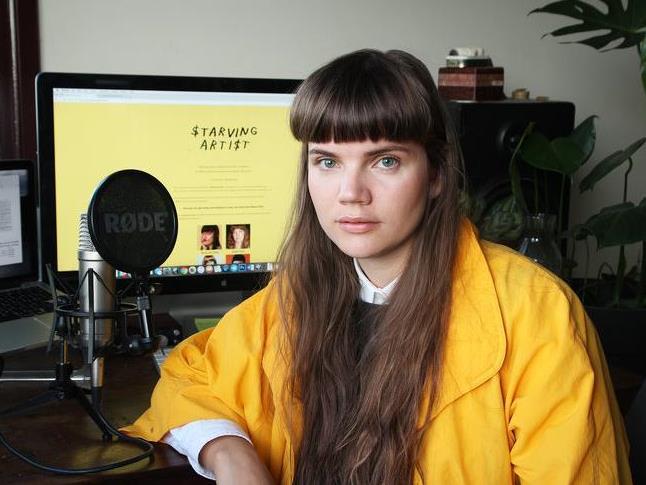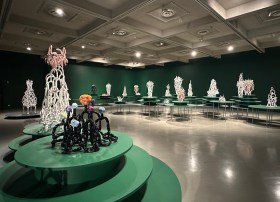Honor Eastly is the founder and host of Starving Artist.
When Honor Eastly was young her parents told her ‘You can do anything’. In retrospective, she is not sure it was a helpful message.
”That is something that middle class kids hear. That is not a thing that everyone hears. It’s also why I’m tearing my hair out now.’
Eastly, an artist and writer, runs Starving Artist podcast which explores the way artists negotiate the world of money. A week after it’s launch it is sitting at number 10 on the iTunes podcast charts, indicating that this is a subject which has captured the interest of many.
Eastly told ArtsHub, ‘I’m 27, and have begun thinking about money and financial planning, and how we actually make this work. It’s really made me look at what money means to me. What’s my money story? That’s informed by your background, and how you saw your parents use money, and it’s really come out in some of the interviews.’
An individual’s relationship with money is tied to their upbringing, their financial history and their self-worth. Add in the emotional labour of producing creative work, and money and art becomes a troubled relationship. ‘Money is not a big focus for me, but I have a lot of anxiety around it,’ said Eastly. ‘It think it comes from ideas around what I should be doing. For me, not having money is really associated with shame. But there’s a duality, where selling out is shameful, but not having money is also shameful.’
The launch featured featured four female artists, all at different stages of their artistic careers. They spoke about how to measure your value and worth, and what success really means.
Be careful what you wish for
Achieving artistic or financial success can be an arbitrary goal, as the realities of being successful and chasing dreams are not always what they are cracked up to be. ‘For me, it’s not so much that success looks different,’ said Wendy Syfret, editor at Vice and i-D. ‘On paper, I have been really lucky, and there are a lot of things that my seventeen year old self would have been really proud of, but I just don’t think I realised how much of a fucking grind it would be.
‘You think that you get your dream job and it’s so nice, but it also means that you wake up in the middle of the night and check your email sometimes, and you feel stressed all the time, and you are mostly friends with people from work. When your dreams come true, they come with a lot of baggage as well.’
Experimentation and practice can help you narrow down what you do and don’t like. ‘You don’t know if you like something and the shit sandwich that comes with it, until you actually do it,’ graphic recordist and writer Sarah Firth told the audience. ‘So giving yourself some leeway to try different things is important. It’s often when you actually experiment that you realise, “oh, hold on, I thought this would be awesome but it’s actually not.”
‘Take a scientific approach and make failure your friend. Failure and fear have been two of the best teaching methods for me, personally.’
Frances Cannon is an artist and body positive activist with almost 100k Instagram followers. She has been making a living out of her art for the past four months. ‘My parents were always conscious that I should get a back-up job. It was okay study art but I should do a teaching degree afterwards,’ she said. ‘Follow your dreams, but not too much.’
Success might not last
Even for those artists doing well in their careers, the anxiety of maintaining their viability is considerable. The cyclical nature of the internet means that this kind of success can be transient and followings on social media are fickle.
Cannon is aware that despite her huge following online, it could all disappear completely. ‘In the next few years, Instagram won’t be the main platform. I never bet on Instagram being my thing, ever. It was never my plan to be an Instagrammer,’ she told the audience.
‘I’m still working towards my goals of being an exhibited artist. Even though I do Instagram, I’m still putting myself out there in the real world as well, so when the day comes that Instagram does die – which it will – I’ll be okay.’
Spreading your eggs
Finding sources of satisfaction other than artistic and professional success is important too. The pressure to make money can get in the way of having a balanced life. Having a variety of interests is important, said Becky Sui Zhen a musician and designer who also enjoys hiking and cooking.
‘I really like all these other things that make me feel good. Just as good as making a really good creative project. Sure, it doesn’t make money and they’re not public facing, but maybe that’s even better. If you add up all those little things, you might get more satisfaction then putting all your expectations on your creative pursuit.’
Maintaining a variety of interests besides a complete focus on your artistic practice can help protect your future self. ‘As I get older, I might not want to be as public with my creative pursuit,’ said Zhen. ‘I want to have a private life that may involve a family and things like that, so I need to have other things in place to diversify my emotional space.
‘Sure, I can keep making these cool projects, but who am I if I lost those projects?’
Eastly told the audience that the process of interviewing artists about money has highlighted how emotional the issue can be, especially as time passes. ‘I see my social groups moving in different directions,’ she said. ‘Some friends can afford to go away for the weekend because they all earn “X” number of dollars, but my friends can’t afford to do that. And (the rift) is just going to get bigger. And it’s not just about being an artist: this is tangible stuff. Can you retire? Can you have kids?’






